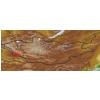| Class: | ferns |
| Order: | Equisetales |
| Family: | Equisetaceae |
| Genus: | Equisetum |
| Scientific name: | Equisetum ramosissimum Desf. |
| Name acc. to: | Gubanov 1996 |
| Herbar: | list records  |
| Description: | Stems perennial, 30-70 cm high, 2-4(5) mm in diameter, branched in lower part, rarely simple. Stem vaginae with many triangular teeth, teeth with up to 2 mm long, readily lost cusp. Sporiferous spikes oval, acute. |
| open map in a new window |  |
| Habitat: | Puffy lower solonchaks (Grubov 2001). |
| Habit (i)general appearance of a plant | |
| Growth form: (i)Herb, shrub, tree or climber. | herb (i)Herbaceous, erect plant, up to 2m high, mostly with a leafy shoot; if perennial, shoots die to the ground each season, shoots are not woody
example: Artemisia pectinata 
perennial (i)Living for several to many years, as opposed to annual and biennial
|
| Flower (i)reproductive portion of the plant, consisting of sepals, petals, stamens, and pistils | |
| Ovary position: (i)For entirely or partly fused carpels, describe their position in relation to the insertion point of perianth leaves (best done by doing a longitudinal section of a flower). | absent (i)Without ovary: male flowers  inherited by order Equisetales: absent inherited by order Equisetales: absent
|
| Root / shoot below ground (i)plant part below ground (in most cases), including below ground shoots, without leaves | |
| Root type: (i)Organisation of the roots. | homorhizous (i)Many equal roots
example: Monocotyledonae  inherited by vasc. plants: homorhizous inherited by vasc. plants: homorhizous
|
| Distribution (i)region where the plant is likely to be found | |
| Distribution (Veg. Zones): (i)acc. to Grubov 1952 | Dzungarian Gobi (i)In distribution data often named as '14' 
acc. to: Gubanov 1996 |